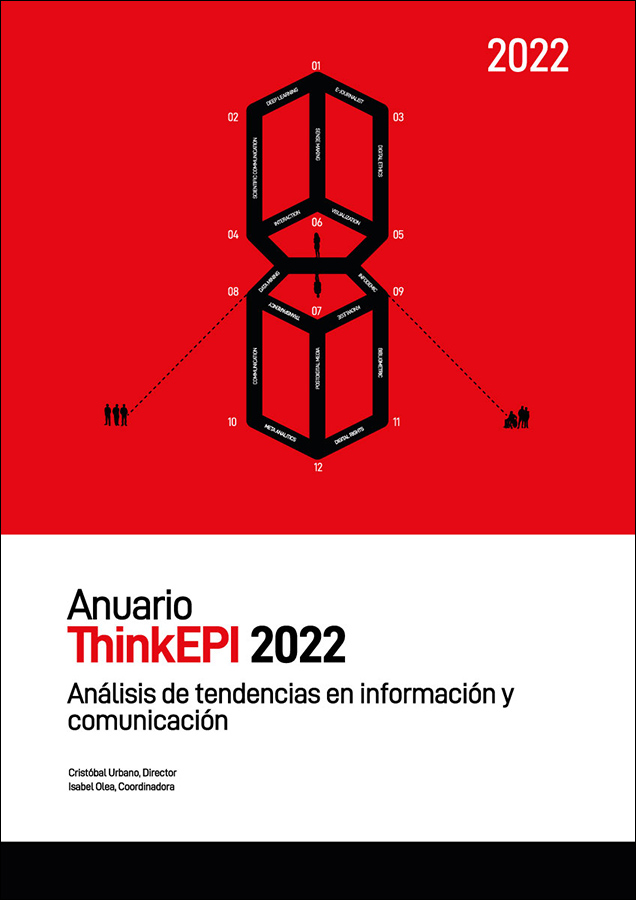Contenido generado por inteligencia artificial: oportunidades y amenazas
DOI:
https://doi.org/10.3145/thinkepi.2022.e16a24Palabras clave:
Creación de contenido, Inteligencia artificial, Aprendizaje profundo, Entretenimiento, Desinformación, Propiedad intelectual, í‰tica de la tecnologíaResumen
En los últimos años se ha visto un crecimiento exponencial de los desarrollos orientados a la creación de contenido textual, gráfico, sonoro y audiovisual mediante inteligencia artificial. Son logros tecnológicos extraordinarios que ofrecen grandes oportunidades potenciales, pero a la vez quedan expuestos a ciertos usos cuestionables que son, en sí mismos, amenazas. Este artículo examina iniciativas recientes dirigidas a la simulación de la escritura humana, la creación de vídeos deepfake, la clonación de voz y la generación de imágenes a partir de indicaciones textuales. De estos desarrollos se comentan los beneficios potenciales y los principales peligros derivados de un uso incorrecto.
Descargas
Citas
Barandy, Kat (2022). "Will artists be replaced by artificial intelligence?". Designboom, 10 agosto. https://designboom.com/art/sebastian-errazuriz-artificial-intelligence-ai-dall-e-replace-artists-illustrators-08-10-2022
Bender, Emily M. (2022). "Human-like programs abuse our empathy: even Google engineers aren´t immune". The Guardian, 14 junio. https://theguardian.com/commentisfree/2022/jun/14/human-like-programs-abuse-our-empathy-even-google-engineers-arent-immune
Bhargava, Cherry; Sharma, Pardeep-Kumar (eds.) (2022). Artificial intelligence: fundamentals and applications. Boca Ratón, FL: CRC Press. ISBN: 978 0367559700
Boden, Margaret A. (2018). Artificial intelligence: a very short introduction. Oxford: Oxford University Press. ISBN: 978 0199602919
Campesato, Oswald (2020). Artificial intelligence, machine learning and deep learning. Dulles, VA: Mercury Learning and Information. ISBN: 978 1683924678
Dale, Robert (2022). "The voice synthesis business: 2022 update". Natural language engineering, v. 28, n. 3, pp. 401-408. https://doi.org/10.1017/S1351324922000146
De-la-Cuadra-de-Colmenares, Elena; López-de-Solís, Iris; Nuño-Moral, María-Victoria (2014). "Uso de imágenes de archivo en publicidad audiovisual: estudio de casos". El profesional de la información, v. 23, n. 1, pp. 26-35. https://doi.org/10.3145/epi.2014.ene.03
Dean, Ian (2022). "You can now sell your DALL·E 2 art, but it feels murky". Creative bloq, 11 agosto. https://creativebloq.com/news/sell-your-dalle-2
Du-Sautoy, Marcus (2020). Programados para crear: cómo está aprendiendo a escribir, pintar y pensar la inteligencia artificial. Barcelona: Acantilado. ISBN: 978 84 17902 37 7
Dzieza, Josh (2022). "The great fiction of AI: The strange world of high-speed semi-automated genre fiction". The Verge, 20 julio. https://theverge.com/c/23194235
Franganillo, Jorge (2022). Formatos digitales: propiedades técnicas y contextos de uso. Barcelona: UOC; EPI Scholar. ISBN: 978 8491809470
Growcoot, Matt (2022). "Getty Images ban AI-generated pictures, Shutterstock following suit". PetaPixel, 21 septiembre. https://petapixel.com/2022/09/21/getty-images-ban-ai-generated-pictures-shutterstock-following-suit
Kreps, Sarah; McCain, R. Miles; Brundage, Miles (2022). "All the news that´s fit to fabricate: AI-generated text as a tool of media misinformation". Journal of experimental political science, v. 9, n. 1, p. 104-117. https://doi.org/10.1017/XPS.2020.37
Lyons, Benjamin A.; Montgomery, Jacob M.; Guess, Andrew M.; Nyhan, Brendan; Reifler, Jason (2021). "Overconfidence in news judgments is associated with false news susceptibility". PNAS, v. 118, n. 23. https://doi.org/10.1073/pnas.2019527118
McCausland, Elisa; Salgado, Diego (2022). "¿Sueñan los androides con ovejas eléctricas? Este es el arte que ya está creando la IA". El grito, 10 agosto. https://elconfidencial.com/el-grito/2022-08-10/arte-creando-inteligenci-artificial_3473503
Metz, Cade (2022). "AI is not sentient: why do people say it is?". The New York Times, 5 agosto. https://nytimes.com/2022/08/05/technology/ai-sentient-google.html
Nightingale, Sophie J.; Farid, Hany (2022). "AI-synthesized faces are indistinguishable from real faces and more trustworthy». PNAS, v. 119, n. 8. https://doi.org/10.1073/pnas.2120481119
Nogales, Elena G. (2022). "En BNElab hemos estado probando el modelo GPT-3 ["¦]". Twitter, 27 junio. https://twitter.com/esnogales/status/1541455846915416066
Osmanovic-Thunstrí¶m, Almira (2022). "We asked GPT-3 to write an academic paper about itself, then we tried to get it published". Scientific American, 30 junio. https://scientificamerican.com/article/we-asked-gpt-3-to-write-an-academic-paper-about-itself-mdash-then-we-tried-to-get-it-published
Pascual, Manuel G. (2022) "Dall·E mini, el popular generador automático de imágenes que hace dibujos sexistas y racistas". El País, 30 junio. https://elpais.com/tecnologia/2022-06-30/dall-e-el-popular-generador-automatico-de-imagenes-que-hace-dibujos-sexistas-y-racistas.html
Roose, Kevin (2022). "An AI-generated picture won an art prize: artists aren´t happy". The New York Times, 2 septiembre. https://nytimes.com/2022/09/02/technology/ai-artificial-intelligence-artists.html
Southern, Matt G. (2022). "Google says AI generated content is against guidelines". Search engine journal, 6 abril. https://searchenginejournal.com/google-says-ai-generated-content-is-against-guidelines
Vincent, James (2022a). "Shutterstock will start selling AI-generated stock imagery with help from OpenAI". The Verge, 25 octubre. https://theverge.com/2022/10/25/23422359
Vincent, James (2022b). "Getty Images CEO says firms racing to sell AI art could be stepping into illegal territory". The verge, 25 octubre. https://theverge.com/2022/10/25/23422412
Warzel, Charlie (2022). "I went viral in the bad way: a few lessons from my mistake". The Atlantic, 17 agosto. https://newsletters.theatlantic.com/galaxy-brain/62fc502abcbd490021afea1e/twitter-viral-outrage-ai-art
Walsh, Shelley (2022). "The best 10 AI writers & content generators compared". Search engine journal, 10 mayo. https://searchenginejournal.com/ai-writers-content-generators
Yu, Ning; Skripniuk, Vladislav; Abdelnabi, Sahar; Fritz, Mario (2021). "Artificial fingerprinting for generative models: rooting deepfake attribution in training data". Proceedings of the IEEE/CVF International conference on computer vision, p. 14.448-14.457. https://doi.org/10.1109/ICCV48922.2021.01418
Descargas
Publicado
Cómo citar
Dimensions


